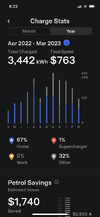- Joined
- 3 July 2009
- Posts
- 27,723
- Reactions
- 24,686
Actually from the research I did before buying what I did, the guess o meter on the Kona was far more accurate than the Tesla. As regard terrain on the coastal strip in W.A it is dead flat.Yeah, but I said if you trip to work was a 250km round trip, and you can charge at home, you wouldn’t need external charging to complete your daily commute then, and that would be most people situation I believe.
—————————————
Sounds like your “range prediction” you are using is just the stated range on the fuel gauge, not a prediction actually taking the lay of the land etc into consideration.
I am not sure about your car, But on the Tesla if you plug the destination into the GPS it will give you an actual accurate prediction based on terrain, weather, traffic etc etc. and tell you what % battery you should have at your destination.
At any one time you can have 3 “range predictions” all saying different things, it’s easy to get confused if you don’t know what sort of prediction you are looking at.
Some would appear to over quote, while some others appear to under quote.
I'm just trying to give a honest opinion from someone who owns one in W.A and actually doesn't need to use it and I do have five electric bicycles and have had several electric scooters so comparing the efficiency is a bit of an interest to me.
Talking about the negatives isn't an attack, it is just a reflection of the reality, unless the charging infrastructure keeps up with the uptake, there will be a major train wreck IMO.
A bit like the electrical power generation over East, unless the alternatives arrive before the current generators pull the pin, there will be a lack of generating infrastructure.
If that happens instead of cash is king, it will be gas is king, everything is relative.
Workers wont charge every day, they will say, i'll wait till tomorrow it is going to be sunny and free.lol

What's The Real World Highway Range Of Today's Electric Cars? We Test To Find Out
We take the most popular electric cars, fully charge them, and then drive them at 70 mph to find out just how far they will go. Which one goes the furthest?

The longest-range electric cars you can buy today | Autocar
Some of the cheapest EVs can crack 200 miles now – but the best can do double that

What Car? Real Range: which electric car can go farthest in the real world?
With demand for electric models soaring, What Car? has developed a test that shows their Real Range between charges. Here we reveal the best and worst performers
Last edited:





